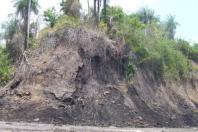Tiny oil shale titan Estonia eyes global boom
Tiny oil shale titan Estonia eyes global boom
October 22, 2013
As experts herald a global shale oil revolution, Estonian firm Enefit, the world's biggest producer of oil shale energy, is pursuing projects in Utah in the United States, and in Jordan with high hopes of high returns.
The state-owned company has acquired one of the largest tracts of privately owned oil shale reserves in the United States and intends to start producing refined shale oil by the end of the decade.
A tiny ex-Soviet EU and eurozone nation of 1.3 million people perched on the north-eastern shore of the Baltic sea, Estonia already generates 91 percent of its own electricity using plentiful domestic oil shale deposits.
Having cleaned up dirty Soviet-era extraction, exploitation and refining methods, it has now accumulated decades of expertise in the sector, still in its infancy elsewhere.
Unlike shale gas, which is extracted using a controversial method known as hydraulic fracturing or fracking, oil shale is dug up in underground or open pit mines and then either burned in power plants or refined into shale oil in a process relying on water.
Estonia's shale hub is Narva, in the northeast near the Russian border. There Enefit, known as Eesti Energia at home, has two underground mines and one open-cast pit fuelling power stations and a shale oil processing plant.
Each year, the company mines about 15 million tonnes of domestic oil shale -- made up of sediment formed 400 million to 450 million years ago containing hydrocarbons.
It hopes domestic production of shale oil will hit 22,000 barrels per day in the not-too-distant future, with more than half being processed into diesel fuel that will go straight to gas stations and into cars.
This is a drop in the bucket compared to the near seven million barrels of crude which the United States produces every day, but still brings Estonia -- the poorest member of the 34-nation Organisation of Economic Cooperation and Development -- a step closer to energy independence.
Exporting expertise
Land in the state of Utah holds an estimated 2.6 billion barrels of shale oil. Enefit American Oil hopes to tap into about 50,000 barrels per day -- or one-third of Utah's daily liquid fuel needs -- by 2020.
While ecologists there worry over environmental impacts -- especially on water resources in the arid area -- critics in Estonia question the plan's economic feasibility and complain the company is hiking energy cost at home to fund the investment abroad.
But Enefit American Oil chief executive, 30-year-old Rikki Hrenko, is optimistic.
Hrenko is confident about the prospects for the company she runs. She told AFP "the economics of the Utah project are strong", tests on oil shale are "going well" and the "possibility of success outweighs the risks."
Company spokeswoman Eliis Vennik also insists that Enefit's unique extraction and processing techniques will safeguard Utah water.
"The amount of water needed is far less than (for) other technologies" like fracking, she told AFP.
Environmentalists grouped in the Utah Tar Sands Resistance are not convinced.
Come "October 25-27, we will be visiting the land that the state-owned corporation of Estonia plans to destroy for a few hours fuel," they vow on their Facebook page.
Meanwhile in Jordan -- where water is also at a premium -- Enefit is developing two projects it says will help the country save hundreds of millions of dollars annually.
"The power project will substitute more expensive methods of electricity generation and shale oil will replace liquid fuels that would otherwise be imported," says Vennik.
Enefit expects Jordan's first oil shale-fired power plant to start generating electricity for local consumption by 2017. It also has plans to produce 38,000 barrels of refined shale oil there per day by the 2020s.
The company's shrewd international moves anticipated International Energy Agency (IEA) forecasts which spoke of a global "supply shock" over the next five years which will drive down fuel prices as shale oil and gas flood international markets.
The effects are already being felt heavily on US and European markets for gas, and by repercussion for coal used in power stations.
Oil shale exists in deposits around the world, including major sites in the US, China, Australia and Jordan, along with Estonia.
Despite a rising tide of opposition fuelled by environmental concerns, the extraction and processing of oil shale is seen by global oil giants as the next big area of development.
And thanks in part to refined shale oil, the US will trump Saudi Arabia and Russia to become the world's biggest oil producer by 2017, the IEA said last year.
ar-mas/hd


